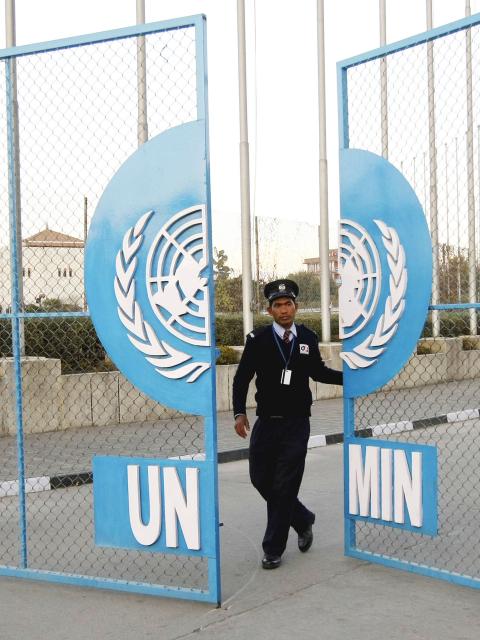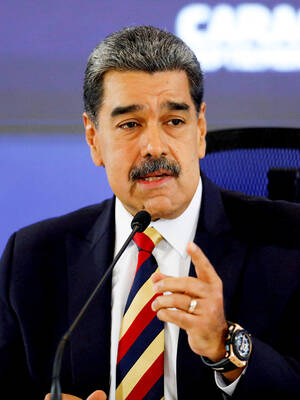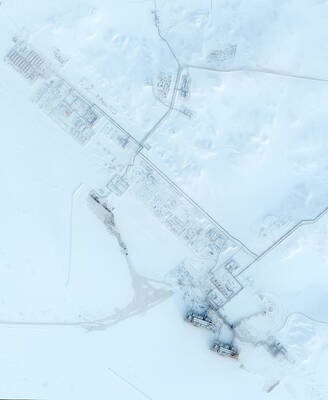A UN mission set up four years ago to oversee Nepal’s post-war transition closed down yesterday, removing a crucial buffer between two armed factions in the troubled nation.
The UN Mission in Nepal (UNMIN) was established in 2007 with a one-year mandate to supervise the peace process that followed a decade-long conflict between Maoist insurgents and the state in which at least 16,000 people died.
Delays in implementing key elements of a 2006 peace agreement, including the integration of 19,000 former Maoist soldiers into the state security forces, meant its mandate had to be repeatedly extended.

PHOTO: AFP
In September, the UN Security Council voted to close UNMIN after a final four-month extension, citing a lack of progress and saying the mission had been unfairly drawn into political battles between the parties.
UN Secretary-General Ban Ki-moon said Nepal’s peace process was “at a crossroads,” but that it made little sense to keep UNMIN open “without any meaningful progress by the parties on political issues.”
At a ceremony to mark the mission’s closure, Ban’s representative in Nepal said many challenges remained.
“We have been reminded every day of how much this country has achieved in a few short years and also of the challenge that lies ahead,” UNMIN chief Karin Landgren said.
“The mission’s contribution to the peace process has been a job well done, but the peace process itself is unfinished,” Landgren said.
The UN has promised to remain involved in Nepal’s peace process even after UNMIN’s departure, but it leaves the country in a state of flux, with no government in place and growing divisions between the parties.
Sixteen rounds of voting in parliament have failed to produce a new leader since prime minister Madhav Kumar Nepal stood down in June and the lack of leadership is hampering development in one of the poorest countries in the world.
The process of drafting a new national constitution aimed at ending the historic social inequalities that were a major cause of the war — another key tenet of the peace deal — has stalled.
Sarah Levit-Shore, head of the Nepal office of the US-based Carter Center, which deploys monitors across the country, said citizens were frustrated and concerned.
“I think this is a fragile time for Nepal,” she said. “It is critical for Nepal’s political leaders to come together, refresh existing agreements and make new and very important agreements in advance of what is a very short constitutional deadline.”
Analysts say the continued existence of the Maoist People’s Liberation Army (PLA), whose soldiers were confined to camps around the country after the war, has added to a growing sense of public unease in the country.
The arrangement was intended as a temporary solution pending a merger of the PLA and the national army, but has dragged on because the Maoists and their political rivals have been unable to reach agreement on the issue.
UN arms monitors who -conduct round-the-clock supervision of the PLA camps, where the Maoists’ weapons are stored in sealed containers, and of a Nepal Army barracks near Kathmandu, were to leave at midnight last night.
The caretaker government and the Maoists, now the main opposition party, agreed late on Friday that a new team of monitors comprising members of the state security forces and the PLA would replace them.
Nepalese political commentator Prashant Jha said UNMIN had acted as a symbolic deterrent against the resumption of violence and predicted the impact of its departure would go well beyond the technical aspects of its work.
“UNMIN leaves at a time when the most complex task of this process — integration and -rehabilitation of the -former -combatants — has not even started,” he wrote in the Indian newspaper the Hindu.
“Peace has held in Nepal because Nepali actors, including the Nepal Army and the Maoists, have behaved with restraint and responsibility, but UNMIN’s exit will make this task more difficult,” Jha wrote.

VENEZUELAN ACTION: Marco Rubio said that previous US interdiction efforts have not stemmed the flow of illicit drugs into the US and that ‘blowing them up’ would US President Donald Trump on Wednesday justified a lethal military strike that his administration said was carried out a day earlier against a Venezuelan gang as a necessary effort by the US to send a message to Latin American cartels. Asked why the military did not instead interdict the vessel and capture those on board, Trump said that the operation would cause drug smugglers to think twice about trying to move drugs into the US. “There was massive amounts of drugs coming into our country to kill a lot of people and everybody fully understands that,” Trump said while hosting Polish President

Japan yesterday heralded the coming-of-age of Japanese Prince Hisahito with an elaborate ceremony at the Imperial Palace, where a succession crisis is brewing. The nephew of Japanese Emperor Naruhito, Hisahito received a black silk-and-lacquer crown at the ceremony, which marks the beginning of his royal adult life. “Thank you very much for bestowing the crown today at the coming-of-age ceremony,” Hisahito said. “I will fulfill my duties, being aware of my responsibilities as an adult member of the imperial family.” Although the emperor has a daughter — Princess Aiko — the 23-year-old has been sidelined by the royal family’s male-only

A French couple kept Louise, a playful black panther, in an apartment in northern France, triggering panic when she was spotted roaming nearby rooftops. The pair were were handed suspended jail sentences on Thursday for illegally keeping a wild animal, despite protesting that they saw Louise as their baby. The ruling follows a September 2019 incident when the months-old feline was seen roaming a rooftop in Armentieres after slipping out of the couple’s window. Authorities captured the panther by sedating her with anesthetic darts after she entered a home. No injuries were reported during the animal’s time on the loose. The court in the

Another tanker carrying liquefied natural gas from Russia’s sanctioned Arctic LNG (liquefied natural gas) 2 project has docked in a Chinese port, ship-tracking data showed, days after Russian President Vladimir Putin met Chinese President Xi Jinping (習近平) in Beijing. The London Stock Exchange Group (LSEG) tracking data indicated the Russian Voskhod LNG tanker was anchored at an LNG terminal in the port of Tieshan in Guangxi, China. The Russian flagged tanker, with a cargo of 150,000 cubic meters of LNG, was loaded up at the Arctic LNG 2 facility in Gydan in northern Siberia on July 19, LSEG data showed.